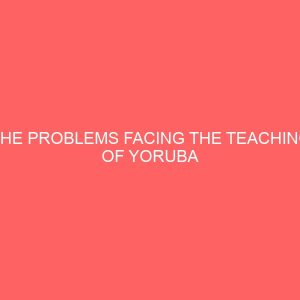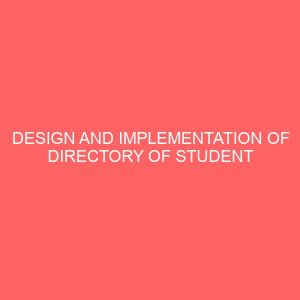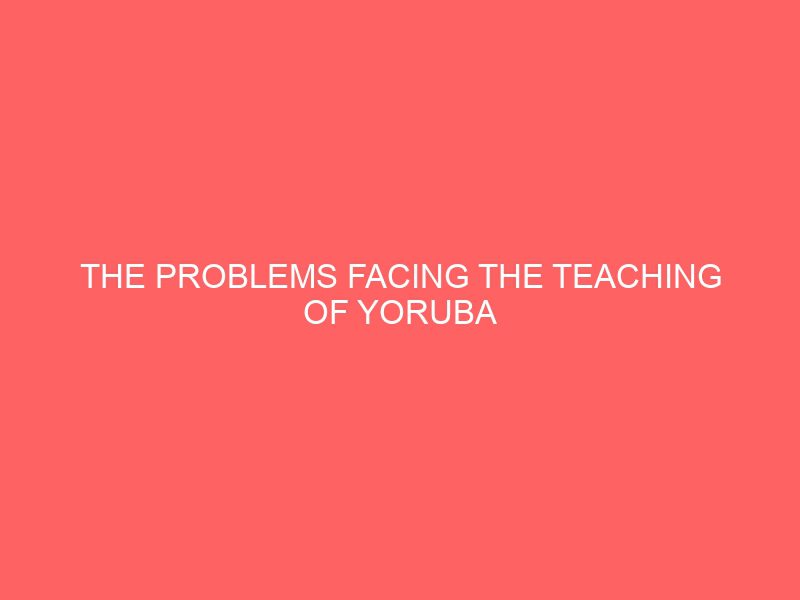Description
ABSTRACT
The purpose of this study is to survey the factors responsible for the problems in the teaching of Yoruba Literature in some secondary schools in Oriire Local Government Areas of Oyo State especially the low enrolment of students for Yoruba Literature in the Secondary Schools.
Some schools in Oriire Local Government were used. A total of eighty students were randomly selected. They took part in filling the questionnaire designed to collect the necessary information from the students.
Another questionnaire was designed to be filled by the teachers. Twenty teachers were randomly selected from four selected secondary schools.
The data collected from the two questionnaires were subjected to descriptive statistics of frequency and percentages.
The study was able to bring out some of problems in the teaching of Yoruba Literature and student low and enrolment in the senior secondary certificate examination.
CHAPTER ONE
INTRODUCTION
1.1 Background to the Study
Language is the most important evolution that has happened to mankind. This is because it is central and pervasive in human thought and it helps a person to know and comprehend what is in the mind of other person. Also, language helps man in his every day activities and in determining his perception of the world around him. This is why today; the level of mans civilization has been as a result of his possession of a language. Furthermore, it is language that distinguished man from other members of the animal kingdom. This is because his unique possession of the art of language has made man to develop progressively over time.
Basically, language is the medium of meaningful communication. This is because a man without a language or unable to grasp or speak a language will have a lot to lose. He would not be able to interact meaningfully with his fellow human beings. Language is more than just sound because it has meanings to members of the same speech community. It is different from any other sounds as it has been developed into vocabularies and it is now presented in both spoken and written forms.
In every human culture, language is pivotal because all other aspect of culture depends on it. This can be seen in the Nigerian situation where there are many cultures with each of them having their own language within the Nigerian Community, there are three major cultures or tribes Hausa, Igbo and Yoruba and a host of over four hundred other. Each of these language have variants and dialects which are spoken in one area, with grammar, words and pronunciation that may be different from other forms of the main language. However, of concerned to this study is the Yoruba language which is spoken predominantly by the Yoruba people of southwest of Nigeria. It must at this point be added that language comes in form of main language and literature.
Literature is basically a form of language which expresses opinion about the society of its creation. This was why Tekpetey 1996 stated that literature of a people represents one of the artistic expressions of the moral and intellectual aspects of their civilization which give literary expression to the culture out of which it grows. Literature within the realm of education is a body of knowledge which catapults human beings from boredom of the physical world in to the realm of an idealized world that is filled with both sensual and sensuous beauty. It depicts man and his environment within a creative mode.
Literature gives students instruction on genres of oral or written language, as well as the basic principles of literary appreciation customs and institution. However, literature at the junior secondary school level is not a subject in its own right but an aspect of language. This is the case of Yoruba literature at this particular level of education. It is meant to complement the Yoruba language.
However, this integration of Yoruba literature in the Yoruba language curriculum can pose a lot of problem to the teaching of the aspect of literature. This is because of such factors as teacher factor, parental factor and problems that could be created due to instructional issues in schools. In a situation whereby nonqualified teachers are made to teach Yoruba language, the technicalities needed to teach literature aspect of the curriculum maybe absent, and this may hinder students interest and achievement in this aspect. Added to this, government places much premium on English language at the deteriment of indigenous language. For this reason, much priority is placed on the recruitment of English language teachers. Along the same line government places special consideration on English instruction. This can be seen in the rate by which instructional facilities are supplied for teaching English without much consideration for indigenous language such as Yoruba.
On their part, parents do not help matters. This is because not much is done by the parents in providing instructional text in Yoruba literature for their child. In such a situation, the teacher will find it difficult to help students learn the genre of the Yoruba language through its literature. Apart from this, very few parent would encourage their children to learn Yoruba language, not to talk of its literature.
All the above noted factors among many others would not only affect students academic performance, but also pose as a problem to the teaching of Yoruba literature.
It is in recognition of the above, that a study on problems facing the teaching of Yoruba written literature in junior secondary schools is carried out.
1.2 Statement of the Problem
According to Ukeje 1995 no educational system can rise above its teachers and no nation can rise above its teachers. This assertion helps to portray the importance of teachers within the educational system in particular and the society in general.
However, the teacher would be handicapped when the necessary in puts into the educational system are absent. Also, teachers are important, but they are not the only factor that make the educational system move. Government as owners of schools, parents as donors of students, the school as the location of learning and the students who receive the education are among the potent factors in the educational system. Their adequacy or inadequacy can pose problems to the educational system. Absence of one means problem to the entire system.
In the teaching of Yoruba literature at the junior secondary school, all the above factors can create problems. It is in recognition of the above that this study is carried out the aim of examining factors that may pose as problems facing the teaching of Yoruba literature in Junior secondary Schools.
1.3 Purpose of the Study
This study is carried out with the aim of investigating into problems facing the teaching of Yoruba literature in Junior Secondary Schools for this reason, the specific objective of the study include:
i To identify factors that may pose as problems facing the teaching of Yoruba Literature.
ii To determine which among the identified factors stands as the greatest problems facing the teaching of Yoruba literature.
iii To determine the effects of such problems on students academic performance of students in J.S.S. Yoruba literature.
iv To reveal the values, skills and habit that could be instill in students by learning Yoruba Literature.
v To develop in students, an appreciation for both oral and written Yoruba literature.
vi To explore ways of teaching Yoruba written literature that may foster in students a positive interest and enhance their achievement in the subject.
1.4 Research Questions
From the above stated objectives of the study, the following research questions are posed to be answered in the cause of carrying out this study:
i What are the problems facing the teaching of Yoruba literature as perceived by students
ii What are the problems facing the teaching of Yoruba literature as perceived by Yoruba teachers
iii Would gender of students influence their perception of problems facing the teaching of Yoruba Literature
iv Would parents educational status influence students perception of problems facing the teaching of Yoruba literature.
v Would there be any difference in perception of problems facing the teaching of Yoruba literature between students from high and low socioeconomic homes.
1.5 Research Hypotheses
Based on the aforestated research questions the following are the research hypotheses formulated for the purpose of this study.
i There is no significant difference in perception of what constitute problems facing the teaching of Yoruba literature between students and Yoruba language teachers.
ii There is no significant difference in perception of what constitute problems facing the teaching of Yoruba Literature between male and female students.
iii There is no significant difference in perception of what constitute problems facing the teaching of Yoruba Literature between students of educated parents and those of illiterate parents.
iv There is no significant difference in perception not what constituted problems facing the teaching of Yoruba Literature between students from home with high and low socioeconomic status.
1.6 Significance of the Study
This study is expected to be of significance, as its outcome would help to identify problems facing the teaching of Yoruba Literature at the Junior Secondary School level. Specifically, the outcome of the study would be significant in the following ways:
i It would be of assistance to Yoruba teachers in helping them to seek for ways of presenting Yoruba literature in such a way that would foster in students, positive interest in the subject.
ii It would help to present to government, areas that need improvement for an effective teaching of Yoruba literature.
iii It would promote in students, positive attitude towards Yoruba literature. Doing this would help to enhance students academic performance in the subject when their interest has been positively skewed towards Yoruba literature.
iv It would be of assistance to curriculum planners as it would help them to design an effective and workable curriculum that would enable teachers engage in teaching Yoruba literature effectively.
v The outcome of this study would serve as a point of awareness, in their need to provide their children with needed instructional materials such as textbook in Yoruba literature.
vi It is expected to be of assistance to future researchers who may be interested in pedagogy problems of teaching Yoruba literature.
vii It would be a point of reference to educational policy makers on the actualization of Nigerian language policy in schools.
1.7 Scope of the Study
This study was carried out with Oriire Local Government Area of Oyo State. The area has more than fifteen junior and senior secondary schools and about one hundred and twenty primary schools. Apart from the above which are public schools, there are also many private nursery, primary and secondary schools within the area. This is why teaching is a major occupation among the elite class. However, the most important economic activities among the people of the area of study are farming and trading.
The people of the area are predominantly Yoruba who are rich in culture, custom and literature. This is why the researcher perceive the area to be ideal for the study.
1.8 Definition of Terms
For the purpose of this study, the following terms are defined so as to allow for clarity of expression.
Junior or Secondary School: This term is used to mean the lower level of secondary education immediately following primary education and it is undertaken for a period of three years.
Problem: This term is used to mean difficulties that may impede the teaching of Yoruba written literature.
Teaching: This term is used to mean the process of transferring knowledge from the teachers to the learners.
Yoruba language: In this study, the term is used mean a school subject which is taught inclusive of Yoruba literature.
Written Literature: This term is used to mean those aspect of Yoruba language which consist of genre of poetry, drama and prose in written text and presented as part of the Junior Secondary School Yoruba language curriculum.








Reviews
There are no reviews yet.